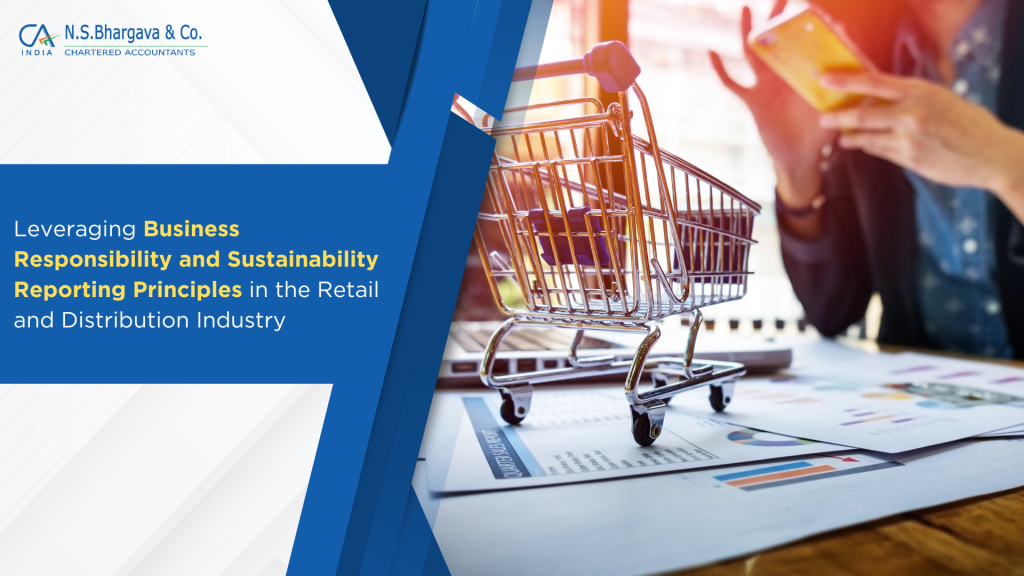
The retail and distribution industry plays a pivotal role in shaping economies and societies. As consumer awareness of environmental and social issues grows, businesses are increasingly expected to operate in a responsible and sustainable manner. Adopting and implementing Business Responsibility and Sustainability Reporting (BRSR) principles is not just a moral imperative but also a strategic necessity for companies operating in this sector.
BRSR encompasses the practice of integrating environmental, social, and governance (ESG) factors into business operations and disclosing performance against these factors to stakeholders. It involves transparently reporting on a company’s impact on the environment, society, and economy, as well as its efforts to mitigate negative impacts and enhance positive ones.
The Relevance to the Retail and Distribution Industry
1. Establishing Trust and Goodwill
In an era where consumers are increasingly conscious of the ethical and environmental implications of their purchasing decisions, businesses that demonstrate a commitment to responsible practices stand to gain trust and loyalty. BRSR provides a platform for retail and distribution companies to showcase their efforts in areas such as ethical sourcing, fair labor practices, and environmental stewardship, thereby enhancing their reputation among consumers, investors, and other stakeholders.
2. Reducing Risks and Vulnerabilities
The retail and distribution industry is not immune to the risks associated with environmental, social, and governance issues. From supply chain disruptions due to climate change to reputational damage stemming from labor violations, companies in this sector face a myriad of risks that can impact their operations and bottom line. By proactively identifying and addressing these risks through BRSR, businesses can bolster their resilience and minimize potential liabilities.
3. Catalyzing Innovation and Streamlining Operations
Embracing sustainability can catalyze innovation and drive operational efficiency within the retail and distribution industry. Whether through the adoption of renewable energy sources, the implementation of circular economy practices, or the optimization of logistics and transportation networks, companies that prioritize sustainability often find themselves better positioned to capitalize on emerging market trends and consumer preferences.
4. Collaborating with Stakeholders and Fostering Participation
Effective stakeholder engagement is essential for the long-term success of any business. BRSR provides a structured framework for retail and distribution companies to engage with a diverse range of stakeholders, including customers, employees, suppliers, and communities. By soliciting feedback, fostering dialogue, and responding transparently to concerns, businesses can strengthen relationships and build partnerships that drive mutual value creation.
5. Compliance with Regulatory Standards
As governments around the world introduce increasingly stringent regulations aimed at promoting sustainability and corporate accountability, compliance has become a non-negotiable aspect of business operations. By aligning with BRSR principles, retail and distribution companies can ensure compliance with existing regulations while also preemptively preparing for future legislative changes, thereby avoiding potential penalties and legal entanglements.
In conclusion, the adoption of Business Responsibility and Sustainability Reporting principles holds immense potential for the retail and distribution industry. By embracing transparency, accountability, and sustainability, companies operating in this sector can not only enhance their competitiveness and resilience but also contribute to the creation of a more equitable and sustainable world. As consumers continue to demand greater social and environmental responsibility from businesses, BRSR offers a pathway for retail and distribution companies to meet these expectations while simultaneously driving value for all stakeholders involved.
Key Insights –
Consumer Expectations: Consumers increasingly prioritize ethical and sustainable practices when making purchasing decisions. Retail and distribution companies that embrace BRSR principles can build trust and loyalty by demonstrating their commitment to responsible business practices.
Risk Management: BRSR enables retail and distribution companies to identify and mitigate risks associated with environmental, social, and governance issues. By proactively addressing these risks, businesses can enhance their resilience and safeguard their reputation.
Innovation and Efficiency: Sustainability can drive innovation and operational efficiency within the retail and distribution industry. Companies that prioritize sustainability often find themselves better positioned to capitalize on emerging market trends and consumer preferences.
Stakeholder Engagement: Effective stakeholder engagement is crucial for the long-term success of retail and distribution businesses. BRSR provides a framework for companies to engage with a diverse range of stakeholders, fostering dialogue and building partnerships that drive mutual value creation.
Regulatory Compliance: Governments worldwide are implementing stricter regulations aimed at promoting sustainability and corporate accountability. By aligning with BRSR principles, retail and distribution companies can ensure compliance with existing regulations and prepare for future legislative changes.
The Way Forward –
Looking ahead, the future success of the retail and distribution industry will depend on its ability to embrace and integrate BRSR principles into business strategies. To capitalize on the opportunities presented by sustainability, companies should:
Embed Sustainability into Business Strategy: Integrate sustainability considerations into core business strategies to drive long-term value creation and resilience.
Invest in Data and Technology: Leverage data analytics and technology solutions to track, measure, and report on ESG performance accurately and transparently.
Collaborate Across Value Chains: Foster collaboration with suppliers, partners, and other stakeholders to address sustainability challenges collectively and drive systemic change.
Continuously improve and innovate: Embrace a culture of continuous improvement and innovation to stay ahead of evolving consumer preferences, regulatory requirements, and market trends.